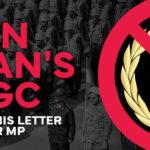British Prime Minister Boris Johnson has written that the UK government opposes Israel’s plans to annex areas of Judea and Samaria (the West Bank). The Prime Minister made the comments in a letter responding to anti-Israel politicians and activist who are calling on the UK government to condemn and sanction Israel if it chooses to take such action.
Conservative MP Crispin Blunt penned a letter to Mr Johnson – signed by 126 MPs and Peers as part of a campaign for the Council for Arab British Understanding (Caabu) – expressing “outrage” at Israel’s plans to annex and called on the UK to “sanction” the Jewish state for what the MPs wrongly define as an “illegal action”.
Sadly, the Prime Minister’s response left a lot to be desired from a pro-Israel standpoint.
The Prime Minister wrote:
PM confirms the anticipated annexation of #Palestinian territory would be breach of int law. But absence of any price for this damages UK interest in rule of law and could imply complicity. We must show UK principles count and help deter #Israel from criminal mistake with action. pic.twitter.com/JiPOMCrKmR
— Crispin Blunt MP (@CrispinBlunt) June 3, 2020
As we made clear at the remote UN Security Council meeting on the Middle East Peace Process on 20 May, we are concerned by reports that the new Israeli government coalition has reached an agreement which may pave the way for annexation of parts of the West Bank. The UK position is clear: any unilateral moves towards annexation by Israel would be damaging to efforts to restart peace negotiations and contrary to international law.
I reiterated our opposition to the unilateral annexation of territory during a call with Israeli Prime Minister, Benjamin Netanyahu, on 6 February. The Foreign Secretary reiterated this message in a call with Israeli Alternative Prime Minister Gantz on 20 May. As the Foreign Secretary said in his statement on 31 January, any changes to the status quo cannot be taken forward without an agreement negotiated by the parties themselves.
The UK’s longstanding position on the Middle East Peace Process has not changed; we support a negotiated settlement leading to a safe and secure Israel, living alongside a viable and sovereign Palestinian state; based on 1967 borders with agreed land swaps, Jerusalem as the shared capital of both states, and a just, fair, agreed and realistic settlement for refugees.
We firmly believe a just and lasting resolution that ends the occupation and delivers peace for both Israelis and Palestinians is long overdue. We will continue to press Israel and the Palestinians strongly on the need to refrain from taking actions which make peace more difficult.
During this fragile period, we also call on both parties to avoid any provocative action which might undermine the cooperation that is so critical in responding to COVID-19.
Prior to the Prime Minister responding to Mr Blunt’s letter, the Prime Minister was urged to reject action against Israel.
Colonel Richard Kemp along with Lord Simon Reading and film-maker Hugh Kitson urged the UK to recognise Israel’s plans to annex parts of the West Bank argued that “the historical and legal facts pertaining to this matter that the signatories of Mr Blunt’s letter seem either to not understand or to reject”.
“Decades spent pursuing the received wisdom reflected in Mr Blunt’s letter have, as you know, proven not only fruitless but have also increased suffering for the Palestinian people and heightened danger for Israeli citizens and the Jewish diaspora.
“Now is the time for new and creative thinking.”
One of the two letters quoted in this article. https://t.co/w8wzunICcy pic.twitter.com/aFESBdbb76
— Rɪᴄʜᴀʀᴅ Kᴇᴍᴘ ⋁ (@COLRICHARDKEMP) June 3, 2020
Col Kemp wrote that he has drawn on his experience of working for the Joint Intelligence Committee to conclude that “the US Administration’s current peace proposals, including sovereignty implementation, in fact represent the best chance for a lasting peace between the two sides as well as a future two-state solution”.
He added: “I believe that this plan also has the potential to bring much-needed prosperity for the Palestinian people as well as greater stability to the region”.
The letter also attacked Mr Blunt and his colleagues for suggesting that “the UK’s response to Israel’s implementation of sovereignty should be to punish the State of Israel with sanctions and other action”.
They write: “On the contrary, I urge you to publicly support Israel’s implementation should it occur, as well as the other components of the US peace proposal.
“Increasing rather than damaging Britain’s trade relationship with Israel is in this country’s economic interest.
“Equally important, as you are well aware, the security of British citizens at home and overseas relies heavily on the continued strong intelligence, defence and technology relationship with Israel.”
They also pointed out in a separate letter that the 1920 San Remo Conference, which recognised the right of the Jewish people to “reconstitute their historic homeland’’, gave their argument legal force.
Related Articles:
We call upon the UK Government to officially recognise Jerusalem is Israel's capital and move its embassy to Jerusalem.











